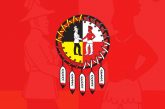
Back row (L to R): Charday James, Dan Smith, Gregory Conway, Brian Paudash, Dana Sliwa, Dixie Myra Shilling, Elder Doug Williams
Front Row (L to R): Poetrie Haddlesey, Susan Feeney, Natalie Jacobs with daughter Maddison, Dr. Julie Kapyrka, Kaitlin Hill, Chief Phyllis Williams
CURVE LAKE FIRST NATION – Curve Lake First Nation Chief Phyllis Williams congratulates the newly trained Cultural Heritage Liaisons as they complete their final module in a 5-week training program in archaeology and heritage.
“Understanding the history of Anishinaabe, being part of work that involves the land and its resources, the teachings we have come to learn about Mother Earth and Water, finding objects that have sacred meaning is integral and paramount for our citizens to be involved. This training enables participants to contribute and be resourceful for project development. Curve Lake community is proud of this success. We congratulate the participants and the helpers who have instilled the importance of such learning. Congratulations!” stated Chief Phyllis Williams.
Citizens from Curve Lake First Nation, Hiawatha First Nation, Mississaugas of Scugog Island First Nation, and Chippewas of Rama First Nation gained a solid understanding of Ontario Archaeology and Anishnaabe cultural values, along with the technical skills of archaeological field work through participating in an actual excavation on a site in southern Ontario.
Curve Lake First Nation hosted this unique training program to create a professionally managed team of Cultural Heritage Liaisons to engage with the archaeological industry in Ontario and to support and facilitate of the return and repatriation of Indigenous heritage and culture to First Nation communities. The program was funded under the Indigenous Culture Fund by the Ontario Arts Council in partnership with the Ministry of Tourism, Culture and Sport.
“I feel that it is very important that field liaisons from First Nations communities who are working on archaeological sites have a foundational base knowledge of archaeological theory and field methods. This arms them with the confidence to engage with archaeologists meaningfully regarding what is being uncovered. This allows for a more fluid reciprocal learning environment in which liaisons can effectively represent their Nation’s cultural heritage interests. There must be a standard of qualification for archaeological monitoring, and this course has fulfilled that need. What made this course different was not only the length of time of intense training but also the inclusion of Indigenous Knowledge at par with academic knowledge. That alone made it really unique and special. It has been a privilege and a pleasure to facilitate this program!” says Dr. Julie Kapyrka, Lands Resource Consultation Liaison for Curve Lake First Nation.








